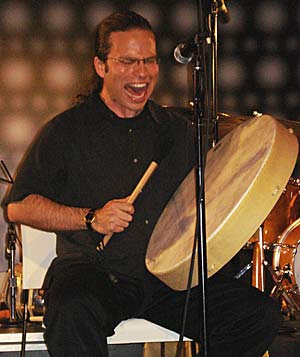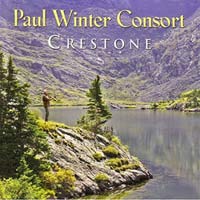UC Berkeley Press Release
Music student adds kudos to
his CV — a Grammy
Winning CD showcases American
Indian singer-scholar
BERKELEY — As a musician and a scholar, "I'm very much about saying 'we're here,' " says American Indian singer and composer John-Carlos Perea. Over the weekend that message of Native survival got a worldwide stage, when the Paul Winter Consort CD Crestone — featuring contributions from the UC Berkeley doctoral student — won a Grammy for Best New Age Album.
 John-Carlos Perea. (Niki Magtoto photo) Hear an excerpt of the Paul Winter Consort's recording of "Witchi Tai To" from the Grammy-winning album Crestone. |
Celebrating a high corner of the Sangre de Cristo Mountains of southern Colorado, Crestone features a handful of original pieces by Perea (performing voice, pow-wow drums, and cedar flute). It also showcases "Witchi Tai To," a song from the Native American church that saxophonist Jim Pepper introduced to mainstream audiences in 1969, in a fusion-jazz arrangement that remained on the Billboard charts for weeks.
As it happens, Pepper, a Creek-Kaw jazz musician who died in 1992, is the subject of Perea's dissertation at Berkeley, where he studies ethnomusicology with a focus on American Indian music. His research, in part, probes the origins of "Witchi Tai To," which is said to be of Comanche origins.
For the Crestone arrangement of the song, Paul Winter used a Brazilian rhythm section, overdubbed with Perea's singing. He also invited Perea to write a portion of the liner notes. "One of Paul's major concerns was that the history of the native people in the U.S. is being erased," says Perea, who discusses American Indian musical tradition in his written contribution to the CD. "If I didn't have the background from Berkeley," he says, "I wouldn't have been able to do that in as effective a way."
Of Mescalero Apache and German-Irish descent, Perea first began playing professionally at 19. His solo and collaborative recordings (featuring his Northern Plains vocals, pow-wow drumming, and electric-bass guitar licks) date back to the late 1990s. After hearing Perea on a recent release, Paul Winter invited the young musician to participate in the Crestone project. "When he called I was totally blown away," Perea recalls.
 The primary recordings for Crestone were
done at 15,000 feet, capturing the natural acoustics
of North Crestone Lake. Perea, however, was studying
for his qualifying exams at the time and couldn't join Winters. Luckily, the
renowned world-music exponent offered to record the
Berkeley grad student in a less-pristine setting,
in Redwood City.
The primary recordings for Crestone were
done at 15,000 feet, capturing the natural acoustics
of North Crestone Lake. Perea, however, was studying
for his qualifying exams at the time and couldn't join Winters. Luckily, the
renowned world-music exponent offered to record the
Berkeley grad student in a less-pristine setting,
in Redwood City.
For Perea, the collaboration on Crestone has opened up new research possibilities. Through Winters he has met musicians who played with Jim Pepper — whom Perea regards as a major figure in popularizing American Indian music. "Without him, I wouldn't have much of a musical or performing or academic career," he says.
Not only Pepper but "a lot of the family" inform Perea's contributions to Crestone. Some tracks — including "Blue Horse Special," composed by Perea's grandfather — are by or about "local American Indian community members who have passed on," he notes. "It couldn't get any better."
He hopes the Grammy will help his attempts to spread the word of American Indian survival. In addition to his research and dissertation writing, he leads the Sweetwater Singers (an intertribal pow-wow drumming group) and is currently a visiting artist at Stanford. "My dream is to combine music and academia," he says. "Many of my musical role models have done just that."
For more information:

